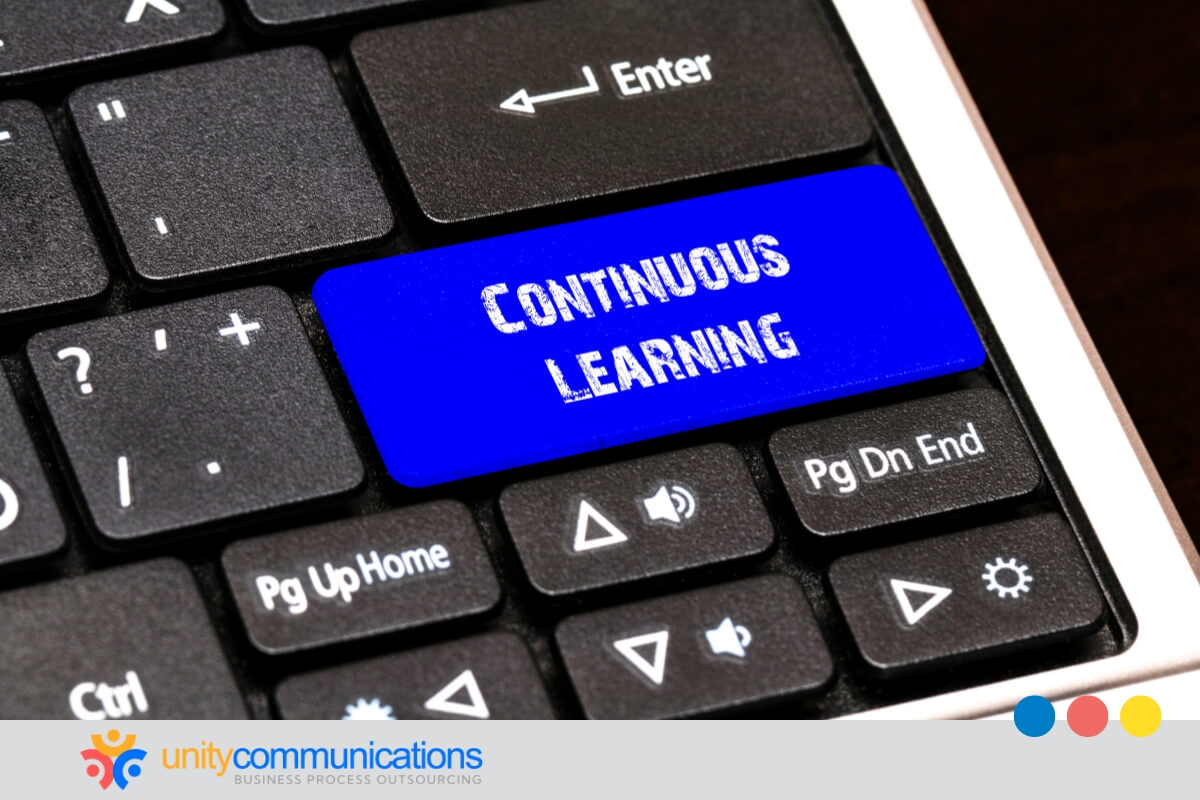Table of Contents
Virtual medical assistants (VMAs) provide cost-effective, flexible, and specialized support for healthcare operations. They manage various non-core functions, such as data entry, appointment scheduling, and medical billing, to help improve operational efficiency and service delivery.
Healthcare institutions increasingly leverage virtual medical assistants through business process outsourcing (BPO). Since VMAs are hired as third-party professionals, organizations must implement proper training to seamlessly integrate them with operations.
Keep reading to discover robust strategies and best practices for training virtual medical assistants effectively!
Comprehensive medical training

Working with a BPO firm is a practical approach to employing VMAs. Gaining access to a global talent pool is typically how outsourcing works to a client organization’s advantage. However, institutions must provide further training to equip VMAs with the knowledge and skills to manage outsourced operations and keep up with the industry’s complex nature.
Courses that solidify foundational knowledge in medical terminology, procedures, and standards assist in training virtual medical assistants effectively. They allow VMAs to process patient information accurately, comply with regulations diligently, and deliver quality service consistently.
Instructional programs provided by accredited institutions can empower VMAs with essential medical knowledge and skills. For example, the Health Insurance Portability and Accountability Act of 1996 (HIPAA) compliance training helps VMAs understand and adhere to privacy and security regulations.
Technological proficiency
Mastery of critical tools and systems is essential for choosing the right virtual assistant. A VMA’s technological proficiency can guarantee that it can manage patient records accurately, coordinate care seamlessly, and facilitate communication effectively.
Outsourcing companies deploy VMAs with such competencies to effectively deliver healthcare processes in BPO. Additionally, training virtual medical assistants effectively in in-house software and systems enhances their capability to support healthcare operations.
Here are common tools VMAs must be proficient in:
Electronic health records (EHR) systems
EHR systems are digital platforms that store and manage patients’ medical information, including histories, diagnoses, treatments, and test results. VMAs must be experts in using EHR systems to ensure accurate and efficient documentation and retrieval of patient data, which is crucial for effective care coordination.
Patient management software
Patient management software is a digital tool for scheduling appointments, managing billing, and coordinating patient care. VMAs must learn to use this software to run efficient administrative operations, reduce scheduling conflicts, and streamline billing procedures.
Telehealth platforms
Telehealth platforms are digital systems that enable virtual consultations and remote monitoring of patients, providing healthcare services without in-person visits. VMAs must be adept in using telehealth applications to support seamless virtual interactions between patients and healthcare providers and maintain care.
Practice management software
Practice management software is a digital tool for outsourcing administrative tasks in healthcare. VMAs must be skilled in using this software to streamline processes, minimize errors, and reduce the administrative burden on healthcare providers. Software expertise enables VMAs to enhance the efficiency and productivity of the healthcare practice.
Medical billing and coding software
VMAs must efficiently use medical billing and coding software to accurately process healthcare claims, patient billing, and insurance companies’ reimbursements. Such competence enables VMAs to optimize revenue cycles, reduce claim denials, manage finances efficiently, and improve patient care delivery.
Training virtual medical assistants effectively in patient interactions

Effective communication is vital for BPO in telemedicine. Training virtual medical assistants effectively in this area must cover empathy, confidentiality, and professionalism to significantly enhance client relations. The following are strategies for well-rounded training:
- Role-playing: In this strategy, VMAs simulate real-life scenarios to improve their communication ability and handle various patient interactions confidently and empathetically.
- Customer service training modules: These modules can help virtual assistants in healthcare BPO services improve patient satisfaction. The training emphasizes courteous and efficient communication while maintaining professionalism throughout the healthcare experience.
- Empathy training: This training helps VMAs deepen their understanding of patient emotions, enabling them to respond empathetically and provide compassionate assistance.
- Confidentiality workshops: These workshops ensure VMAs grasp the critical importance of patient privacy and data security. They equip these professionals with a deeper understanding of protocols and practices to maintain confidentiality in all work aspects.
- Professionalism seminars: These seminars reinforce the significance of maintaining a professional demeanor in every interaction, emphasizing respect, integrity, and adherence to ethical standards in healthcare settings.
- Cultural sensitivity training: This training equips VMAs to navigate diverse patient backgrounds effectively and communicate respectfully.
- Active listening exercises: These activities help VMAs develop better listening skills to understand patient concerns thoroughly and respond accurately.
Continuous learning and adaptation

Continuous learning is critical to maintaining high standards. Ongoing training of VMAs also helps companies adapt to the evolving healthcare industry.
The following are platforms and resources for continuing education tailored to VMAs to keep them knowledgeable and effective in their roles.
- Medscape has diverse courses and resources tailored for medical professionals. It covers the latest advancements in healthcare research, clinical practice guidelines, and continuing medical education credits.
- Coursera offers various healthcare-related courses from renowned universities and institutions worldwide. They can enhance their knowledge in specialized areas such as healthcare management, public health, and telemedicine.
- American Association of Professional Coders (AAPC) offers specialized training and certification programs in medical coding, billing, and compliance. AAPC equips VMAs with the expertise for accurate documentation, coding, and reimbursement processes.
- Healthcare Information and Management Systems Society (HIMSS) provides valuable resources and certification opportunities for healthcare technology proficiency. It offers VMAs insights into the latest trends and best practices in healthcare technology so that they can effectively leverage it to enhance patient care.
- Udemy offers affordable and flexible healthcare courses covering medical terminology, patient care fundamentals, and telehealth best practices, allowing VMAs to upskill at their own pace.
- LinkedIn Learning provides a range of professional development courses in communication, time management, and healthcare-specific skills, helping VMAs stay effective and adaptive.
The bottom line
Training virtual medical assistants effectively requires a well-rounded approach that includes medical knowledge, technological proficiency, and communication skills. By investing in comprehensive training programs, healthcare practices can ensure their VMAs can perform at their best.
Find out how BPO services can enhance care quality and improve operational efficiency in your healthcare practice. Let’s connect!




